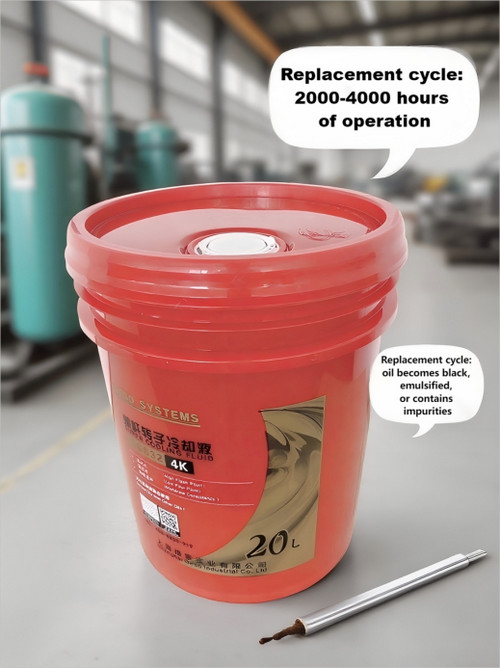The replacement cycle and judgment method of air compressor lubricating oil need to be comprehensively considered in combination with factors such as equipment type, operating environment, and lubricating oil type. The detailed description is as follows:

1. Regular replacement cycle of air compressor lubricating oil
Different types of air compressors and usage scenarios have significantly different replacement cycles. The common reference standards are as follows:
1)Classified by equipment type
- Piston air compressor: It is generally replaced every 500-1000 hours of operation. Due to the severe friction during the operation of piston equipment, the lubricating oil is easily contaminated, so the replacement cycle is relatively short.
- Screw air compressor: When mineral oil is used, it should be replaced every 2000-4000 hours of operation; when synthetic oil is used, the replacement cycle can be extended to 6000-8000 hours (some high-performance synthetic oils can even reach more than 10000 hours).
- Centrifugal air compressor: It is usually replaced every 8000-12000 hours of operation. For specific circumstances, please refer to the equipment manual.
2)Adjustment according to the operating environment
- If the environment has a lot of dust and high humidity (such as mines, construction sites), or the compressed air has strict oil content requirements (such as food and pharmaceutical industries), the replacement cycle needs to be shortened by 20%-30%.
- For long-term low-load operation (load rate below 50%), the oxidation rate of lubricating oil accelerates. It is recommended to replace it compulsorily every 6 months (even if the operating hours are not reached).
2. Methods to determine if lubricating oil needs to be replaced
In addition to referring to the cycle, it can also be judged by the following intuitive ways:
Appearance observation
- Normal lubricating oil is clear light yellow or brown;
- If it turns black, turbid, or contains obvious impurities (such as metal debris, sludge), it needs to be replaced immediately.
Viscosity detection
Take a small amount of lubricating oil and drop it on a glass plate. If the fluidity becomes poor (too thick) or too thin, it means that the viscosity no longer meets the requirements and needs to be replaced.
Odor identification
- Normal lubricating oil has no pungent odor;
- If it emits a burnt smell or sour smell, it indicates that the lubricating oil has oxidized and deteriorated and needs to be replaced.
Performance test
Professional instruments can be used to detect indicators such as acid value, flash point, and water content of lubricating oil:
- Excessive acid value (greater than 0.5mgKOH/g): indicates that the oil has been oxidized and its corrosiveness has increased;
- Water content exceeding 0.1%: will reduce the lubricating effect and cause equipment rust.
3. Precautions
- When replacing the lubricating oil, the oil filter should be replaced at the same time to avoid impurities in the old filter contaminating the new oil.
- Lubricating oils of different brands and models must not be mixed to avoid chemical reactions that affect performance.
- It is recommended to replace the lubricating oil in advance for the first operation of a new machine (usually after 50-100 hours of operation) to remove metal debris generated during the running-in period.
Through the above methods, it can be ensured that the air compressor lubricating oil is always in good condition, prolonging the service life of the equipment and reducing the occurrence of faults.



